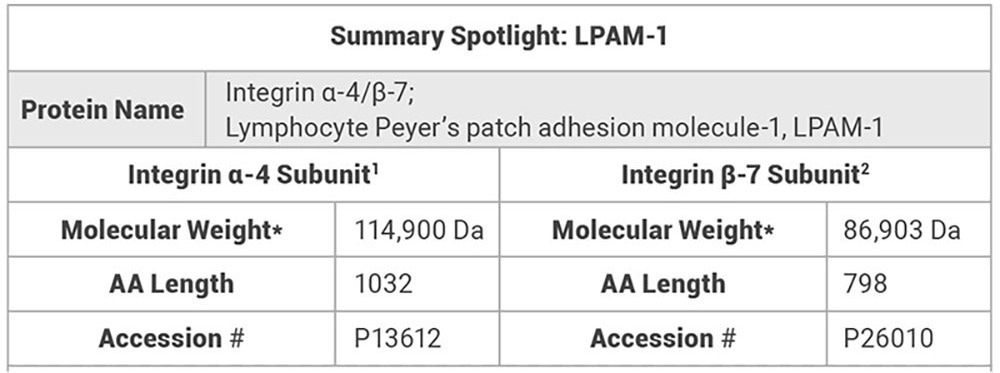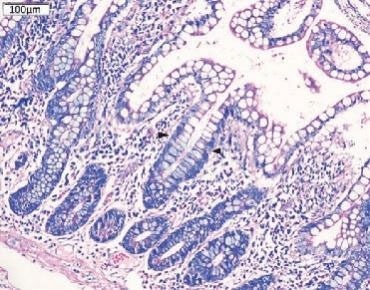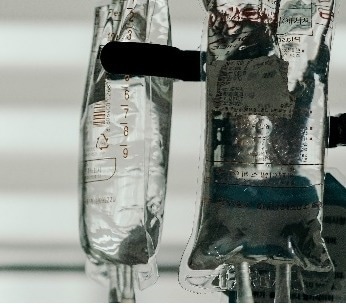Integrin α-4/β-7 - also known as Lymphocyte Peyer’s patch adhesion molecule-1 (LPAM-1) - is an integrin heterodimer composed of covalently linked α-4 and β-7 subunits. Expressed on the surface of lymphocytes, LPAM-1 acts as a homing receptor that facilitates the adhesion of lymphocytes onto endothelial cells.
Increased expression of LPAM-1 is found on memory CD4+ T cells near intestinal tissues. Furthermore, LPAM-1’s primary ligand is mucosal vascular addressin cell adhesion molecule 1 (MAdCAM-1), a receptor specifically expressed on intestinal lamina venules and gut secondary lymphoid organs.
Resultingly, LPAM-1 plays an important part in chronic gastrointestinal disorders and is recognized as a critical therapeutic target.
Source: ACROBiosystems

Clinical significance
The interaction of LPAM-1 with MAdCAM-1 is mostly contained in the gastrointestinal area, facilitating the transfer of immune cells in the gut. As a result, most LPAM-1 targeted therapies focus on the relief of inflammation of gastrointestinal tissue caused by disorders such as colitis, ulcerative colitis, or Crohn’s disease.
Other diseases, such as HIV and graft-vs-host disease, have also been implicated in gastrointestinal dysfunction and the use of related gut-associated lymphoid tissue as key sites for infection or activation, respectively.
Inflammatory bowel diseases

Image Credit: ACROBiosystems
Studies show that under the steady state, the interaction of LPAM-1 and MAdCAM-1 allows B and T cells to move into the intestine. In inflammatory bowel diseases (IBD), T cells enter the intestine, contributing to chronic colonic inflammation.
The inflamed mucosa from ulcerative colitis or Crohn’s disease have an elevated expression level of MAdCAM-1 to attract more immune cells toward the site of inflammation. To resolve this, LPAM-1 antagonists have been created to prevent lymphocyte penetration into gut-associated lymphoid tissues.3
Human immunodeficiency virus (HIV)

Image Credit: ACROBiosystems
Recent findings have revealed that the HIV-1 glycoprotein is able to bind to LPAM-1. As a result of the interaction between LPAM-1 and MAdCAM-1, CD4+ cells infected with the HIV-1 virion are led to the gut mucosa, causing seeding and replication in the intestines during early infection.
As such, targeting LPAM-1 for HIV prophylaxis has immense potential in developing a therapy against HIV. However, clinical results have been conflicting, with no clear correlation between HIV-1 infection and LPAM-1.4
Graft-vs-host disease

Image Credit: ACROBiosystems
Graft-vs-host disease (GVHD) is a key challenge for tumor immunotherapy via bone marrow transplantation. Typically, donor T cells upregulate the expression of LPAM-1 as they penetrate the intestinal mucosa and separate into effector cells.
Disruption of either MAdCAM-1 or LPAM-1 may decrease the quantity of intestine-infiltrating donor T cells and help to relieve intestinal injuries caused by GVHD.5
Therapeutic status of LPAM-1 targeted therapies
Presently, there is a total of three approved therapies that target LPAM-1, with all of these listed in Table 1. All three therapies are indicated for various uses centered on alleviating gut inflammations, including GVHD, inflammatory bowel diseases, and other types of cancers.
Table 1. Integrin α4/β7 marketed drug information. Source: ACROBiosystems

Vedolizumab is also being considered for the treatment of HIV infection. However, the understanding of HIV pathogenesis is still incomplete, giving mixed clinical evidence against HIV infections.
With the acceptance of several integrin inhibitors for LPAM-1, integrins have been studied comprehensively, with more than 130 clinical trials since 2015.
Of the 24 known integrin heterodimers, only six in total have been accepted: three as antibodies and the other three as small molecules. The two approved LPAM-1 inhibitors - natalizumab and vedolizumab - have contributed $4 billion USD per year, paving the way for upcoming integrin inhibitors.3
Table 2. Drugs targeting Integrin α4 / β 7 in ongoing clinical trials. Source: ACROBiosystems

Future directions and perspectives
Generally, there are multiple directions that have been considered for integrins. The first is based on drug delivery and concentrates on therapies that are delivered orally. This may help to considerably increase the availability of integrin inhibitors.
The second direction focuses on the inhibition of various integrins, particularly αv-containing integrins, to fight fibrotic diseases.
These diseases, such as nonalcoholic steatohepatitis and idiopathic pulmonary fibrosis, have a substantial and unmet medical need, meaning it is a motivating target. Likewise, since integrins play a critical part in cell signaling and transport, this family of molecules holds great potential to treat a variety of diseases, including cancer.
To speed up the research and development of integrin-targeting drugs, ACROBiosystems has a catalog of all 24 known integrin heterodimers, such as integrin α4/β7, expressed through its HEK293 platform and verified by SEC-MALS.
References
- ITGA4 - Integrin alpha-4 - Homo sapiens (Human) | UniProtKB | UniProt. https://www.uniprot.org/uniprotkb/P13612/entry.
- ITGB7 - Integrin beta-7 - Homo sapiens (Human) | UniProtKB | UniProt. https://www.uniprot.org/uniprotkb/P26010/entry.
- Slack, R. J., Macdonald, S. J. F., Roper, J. A., Jenkins, R. G. & Hatley, R. J. D. Emerging therapeutic opportunities for integrin inhibitors. Nat. Rev. Drug Discov. 21, 60–78 (2022).
- Ueha, S. et al. Intervention of MAdCAM-1 or fractalkine alleviates graft-versus-host reaction associated intestinal injury while preserving graft-versus-tumor effects. J. Leukoc. Biol. 81, 176–185 (2007).
- Liu, Q. & Lusso, P. Integrin α4β7 in HIV-1 infection: A critical review. J. Leukoc. Biol. 108, 627–632 (2020).
About ACROBiosystems
ACROBiosystems is a cornerstone enterprise of the pharmaceutical and biotechnology industries. Their mission is to help overcome challenges with innovative tools and solutions from discovery to the clinic. They supply life science tools designed to be used in discovery research and scalable to the clinical phase and beyond. By consistently adapting to new regulatory challenges and guidelines, ACROBiosystems delivers solutions, whether it comes through recombinant proteins, antibodies, assay kits, GMP-grade reagents, or custom services. ACROBiosystems empower scientists and engineers dedicated towards innovation to simplify and accelerate the development of new, better, and more affordable medicine.
Sponsored Content Policy: News-Medical.net publishes articles and related content that may be derived from sources where we have existing commercial relationships, provided such content adds value to the core editorial ethos of News-Medical.Net which is to educate and inform site visitors interested in medical research, science, medical devices and treatments.